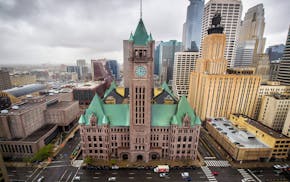Twin Cities business leaders have long known that the Vikings stadium issue puts them in a damned-if-they-do, damned-if-they-don't spot with their fellow Minnesotans.
Say too much, and folks are bound to accuse them of throwing their weight around to tap taxpayers' money. Say too little, and somebody (like me) will ask, "Where are you guys?"
Ecolab CEO Doug Baker and U.S. Bank CEO Richard Davis have lived with that dilemma for more than two years. They've led an ad hoc group -- so ad hoc that it doesn't have a name -- of about two dozen CEOs that came together on their own initiative with the singular intention of keeping the Vikings in Minnesota for the next half-century.
They opted for a low profile -- until this week. It's "now or never" time for keeping the Vikings in Minnesota for the next 50 years, Baker and Davis said Monday in a joint interview.
The Twin Cities' status as what they called "an A-class city" is on the line at the Capitol this week and next, they said. It's time to go public with that message and ask civic-minded citizens to chime in, too. Here's some of what they said:
Baker: "This is not about the business community. This is what's good for the community. A strong community is very important for a successful business. It's akin to education, transportation, the arts, the nonprofits and other amenities in the city, to make sure we have a work environment that's conducive to long-term, healthy employees. It all works together.
"We came very quickly to the conclusion that losing the Vikings would be a huge blow to this community, whether you are a fan or not."
Davis: "We know how this story ends. If we don't keep the Vikings, they move away. We build another stadium anyway; we get another team anyway, and we pay handsomely more for that.
"You can ask cities like Houston, Baltimore, Los Angeles. They've all lost franchises, and they all come back around ... at much higher cost. It's financially prudent to not lose an NFL franchise."
But clearly, there's more than money at stake for Baker and Davis. There's pride. The stadium issue tests whether this generation of leaders will live up to the aspirations of those who came before.
Davis: "It's about reputation. It's who we are. This community was founded by people who believed in a holistic community. A place that's safe to raise a family, that's fun to live in, where values are created."
Baker: "There is a quiet expectation here, a very good one, that [a CEO's] job is not just to grow your company, but to be involved in the community. That's cultural here."
Davis: "What should I think of a community that wouldn't support a 50-year-old icon and infrastructure that relates in part to who they are? What should I take away from that, if this community can't rally behind that?"
Minnesota's biggest businesses are global companies. But the CEO effort to keep the Vikings refutes the charge that modern Minnesota enterprises care less about their hometowns than their predecessors did. Davis and Baker echo the CEOs of the 1950s who brought big-league sports to this state.
Davis: "It matters for the reputation of our company to be headquartered in a city recognized as one of the world's great cities. I can't put a dollar amount around it. I can't say that the world will fall apart if we don't have an NFL franchise here two years from now. But it will be a lot less attractive and a lot less easy to brag about the headquarters being in one of the great American cities."
Baker: "If Ecolab or General Mills left, it would be a huge tragedy, but the headline would last about a half a minute anywhere but here. If the Minnesota Vikings leave, from a visibility standpoint, it is a huge statement about this community's willingness to invest in its future. This issue has outsized risk."
This week, that risk has finally trumped the damned-if-you-do hazard associated with CEO lobbying for a new Vikings home.
Baker: If the Legislature does not authorize a stadium this year, "our negotiating stance weakens considerably from here on out. The NFL has been a very good partner for us. They've been very clear with the Wilfs: 'You have an engaged partner. We expect you to get a deal done here because you have a willing partner.'
"If we prove that we're not a willing partner, the NFL is going to have no choice but to open up the door for the Wilfs."
Davis: "We have to show evidence of good faith in working to keep them. If we fail this week or next week, that good faith is gone."
Baker: "This is a hugely time-sensitive issue. You really have to make a decision here. If you're not for moving forward on this now, what you're willing to do is have the Vikings leave."
Like this state's best CEOs before them, Davis, Baker and their cohorts are finally, publicly out front, pulling this civic bandwagon. That greatly boosts chances that it's gonna move.
-------------
Lori Sturdevant is a Star Tribune editorial writer and columnist.

As a topic among policymakers, housing is hotter than it once was
Worries about the U faded in search for new president

Up next for the DFL: amending the state Constitution
To combat contempt of courts, there's no substitute for character


